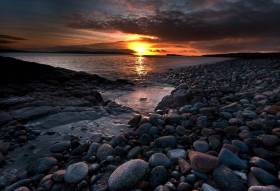Displaying items by tag: Ballinacourty
Death of a Fisherman, Loss of a Friend
The death in hospital of a lone fisherman after a tragic accident in Galway Bay on Wednesday moved Pierce Purcell of Galway Bay Sailing Club to post these thoughts yesterday to his fellow GBSC members, and he has forwarded them to Afloat.ie. We join with him and his friends and colleagues in heartfelt condolences to the family of Patsy Kelly
“Hearing the news of a lost fisherman on the late news last night, I drove to Renville Quay this morning afraid to press buttons on my phone to our harbour friends or the Ballinacourty fisherman many of us knew so well, for the obvious fear of what I might be told.
To my relief there were three well-known fishermen on the pier chatting in light rain. But on approaching Stephen Walsh who could not hold back the tears, I learnt the sad news that the lost fisherman was Patsy Kelly from Ballinacourty close to the club.
Patsy was an absolute gentleman, a full time fisherman yet interested in sailing and sailors. He built the hooker MacDuach before selling her to Dr Michael Brogan of Kinvara, the chair of Crinnu na mbad festival.
He was particularly safety conscious, and was recovered by the RNLI wearing his lifejacket. He was a serious fisherman who loved and respected the Bay, and was very well respected by all who shared his fishing grounds, which are our playgrounds.
Recently I had asked him to give a talk to the club this winter on “Fishing locally, the history of Island Eddy, and the Bay we use”. Although he was a shy man, he knew and cared enough about the topic to give the idea of such a talk some serious thought.
Our deepest sympathy to his wife Anne who spent many years windsurfing at Renville, and his son, to be married next week.
God Bless you, Patsy”





























































